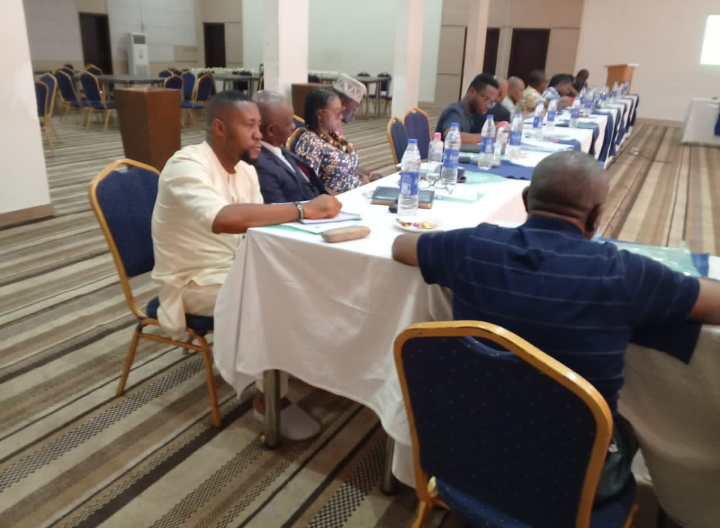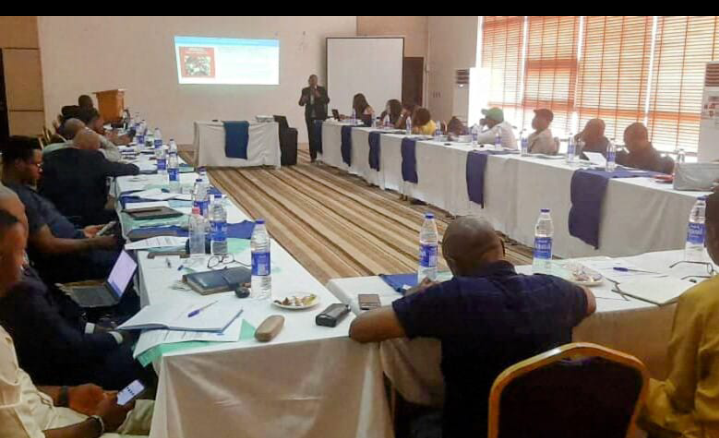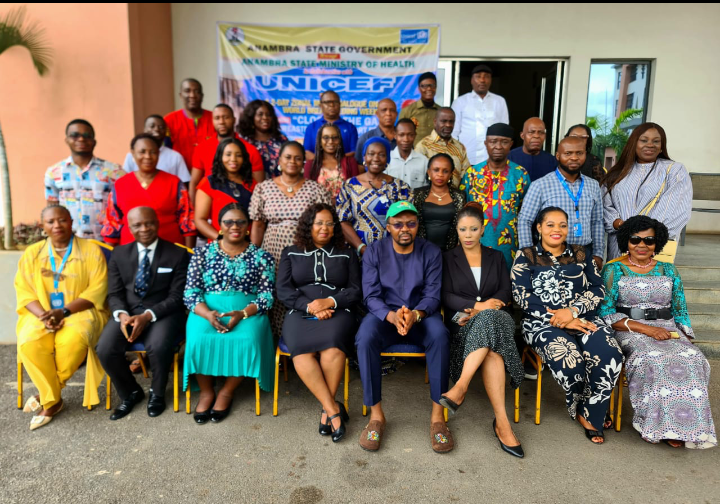By Efa Sunday
United Nations Children’s Fund (UNICEF) and other stakeholders have decried the yawning gap of women not breastfeeding their babies within one hour of delivery and doing the compulsory first six months exclusive breastfeeding.
For not doing this, they said it is a sin and a great act of injustice mothers are doing to their babies.
UNICEF and other stakeholders said this at a “Two Day Media Dialogue on World Breastfeeding to Drive Nigeria’s Nutrition Zero Water Campaign for Improved Exclusive Breastfeeding Mothers for Infants in Enugu, Benue, Cross River and Anambra” at Golden Tulip Hotel, Agulu Lake, in Anambra state from August 26 to 27.
Presenting a paper on, “Closing the Gap-Breastfeeding Support for All,” a Nutrition Specialist at the UNICEF Field Office in Enugu, Mrs. Ngozi Onuora, said, the Demographic Health Survey data of 2021 puts exclusive breastfeeding rate among mothers within first six months of delivery in Nigeria at only 34 percent which is low and below global target which is 50 percent and there is need to close the gap of not starting early.
She stated that putting babies to breastfeed at birth, that is, the first one hour of delivery is very good for the babies but the 2021 Multiple Cluster Survey indicates that, no state in the four states at the meeting is doing well at this early baby initiation and “it is a sin to deny babies breast milk” and it always better to have the baby and the mother together for warmth and intimacy.

The Nutrition Specialist emphasized that, starting breastfeeding on time helps the mother and the baby as “the more you breast feed the more the milk comes” and the first week is critical and a child without enough nutrients which is from the mother’s breast milk “cannot thrive well hence the need for early breast feeding”.
She decried the habit of some breastfeeding mothers giving their children water and other things within the first six months of delivery saying this is dangerous to the babies.

She highlighted on the benefits of breast milk saying, it protects good health, reduces death by 87 percent, checks rascal and violent behaviour in a child and “if a child carries a gun, such a child did not benefit from exclusive breastfeeding” but exclusive breastfeeding promotes peaceful and developed Nation and violence free election.
She further added that exclusive breastfeeding “improves maternal health and helps the womb to set back” and a child with a compromised immune system will not be safe even when given vaccine .
Contrary to stereotype believes, Onuora said, “breast milk has enough water for the daily water needs for the first six months of a child’s life”, revealing that breast milk is composed of 88 percent water, 7 percent lactose, 1 percent protein, and 4 percent of fat and provides sufficient hydration to meet an infant’s daily needs during the first six months of life.
She charged the media to inform policymakers about the disparities and deficiencies related to exclusive breastfeeding, which is vital for both maternal and child health as the seven action plan on breastfeeding, states the need for increased funding to address issues of exclusive breastfeeding, the need to check activities of some companies that have compromised breastfeeding policies, give improved access to exclusive breastfeeding counselling and others.
Some notable challenges inhibiting exclusive breastfeeding include poor funding, political instability, insecurity as health workers are not allowed to go and work in some areas, low level of early initiation, stereotypes like the breast will fall but “breastfeed or not the breast will fall”, she said.
UNICEF and other stakeholders urged media outlets to avoid allowing commercial interests to compromise breastfeeding potentials and negatively affect breastfeeding rates noting that international code of marketing of breast milk substitutes, bans advertising and other promotional activities related to infant formula, breast-milk substitutes, feeding bottles, and few others.
In her welcome address at the Zonal Media Dialogue on World Breastfeeding organized by Anambra State Ministry of Health in with support from UNICEF, the Chief of Field Office for UNICEF in Enugu, Juliet Chiluwe, urged the media to take an active role in promoting and supporting the initiative of six months exclusive breastfeeding without water.
She challenged the media to close the gap through its write ups as “every child needs to be breastfed exclusively within the first one hour of delivery and for the next six months”.
“This is a big task and a mind-set change needs buying in and we cannot do without the media. The media has a key role to play to close the gap. Let women know why they should breastfeed their children exclusively for six months without water and why they should initiate it within one hour after delivery. It is a fundamental right of every child to be breastfed. It is key to achieving the Sustainable Development Goals, SDGs,” she said.
On his part, the Anambra State Commissioner for Health, Dr Afam Obidike, said the issue of exclusive breastfeeding is a serious matter as Anambra is close to implementing a policy requiring mothers to begin breastfeeding within the first hour after delivery.
He said, “it is mandatory that any woman who delivers at our primary health centre gets incentives and we punish any personnel whose centre a woman puts to bed and the child is not put to breastfeeding within one hour of delivery…as exclusive breastfeeding helps the woman not to bleed especially if done within first one hour of delivery ”.
He emphasized the importance of cooperation between public and private hospitals to successfully promote and realize this objective of exclusive breastfeeding because “a child that is not well breastfed is like a soldier who goes to a battle without bullets”.
Delivering a key note address on, “Enriched Media Advocacy for ‘Zero Water campaign’-Collaboration for three Months Media Pitch Promoting Exclusive Breastfeeding for the First Six Months”, Prof. Stella Okunna of the Department of Mass Communication and Deputy Vice Chancellor, Paul University, Awka, charged Journalists to do developmental journalism for positive and behavioural change.
Prof Okunna who is the first woman professor of Mass Communication in Nigeria, said journalists should engage in strategic communication in the course of their duty especially while reporting specific issues like exclusive breastfeeding and “must do pre-project research, know your target and what is on ground for situation analysis”.
To get the message of exclusive breastfeeding across effectively, she said journalists must do advocacy with policy makers, do social mobilization, elicit popular participation and feed back, and achieve attitudinal and behaviour change through their write ups in their various media outlets.
On her part, the Communications Officer, UNICEF Enugu Field Office, Dr Ijeoma Onuoha-Ogwe also charged journalists to champion and increase awareness on the campaign for zero water for exclusively breastfed babies in the first six months after delivery and to ensure the subsequent breastfeeding of babies for two years.
She stated that just nine percent of organizations have a workplace breastfeeding policy and emphasized that the media is crucial for changing the narrative and perceptions by enhancing awareness about breastfeeding and the Zero Water Campaign.
She said there is need for the media to stop promoting negative reports or advertorials that tend to promote women or breastfeeding mothers embracing feeding practices that are harmful to their babies and promised to avail journalists with “adequate information in achieving our SDGs”.
The UNICEF Data Officer, Jerry Nweke, in his presentation, “Updated 10 Steps to Successful Breastfeeding-Protecting, Prompting and Supporting Breastfeeding: The Baby Friendly Initiative (Zero Water Campaign), said the revised or updated 10 step are aimed at a successful breastfeeding.
Unfortunately, he said that “this policy that is meant to promote successful breastfeeding is not well implemented by the private and government hospitals and we expect these policies to be well publicized and penalties must be implemented for staff failing to adhere to the 10 steps”.
Nweke said the media has a major role to play in this regards and appealed to the media to create sufficient awareness, provide education on exclusive breastfeeding through their various publications, do interviews, identify babies friendly hospitals, support the message of exclusive breastfeeding and change misconceptions or stereotypes on where and how mothers should breastfeed.





